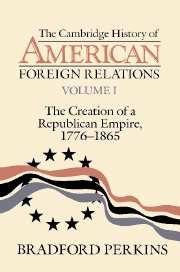Book contents
- Frontmatter
- 1 The Canvas and the Prism
- 2 The Birth of American Diplomacy
- 3 The Constitution
- 4 Federalist Diplomacy: Realism and Anglophilia
- 5 Jefferson and Madison: The Diplomacy of Fear and Hope
- 6 To the Monroe Doctrine
- 7 Manifest Destiny
- 8 Britain, Canada, and the United States
- 9 The Republican Empire
- Bibliographic Essay
- Index
- THE CAMBRIDGE HISTORY OF AMERICAN FOREIGN RELATIONS
- References
8 - Britain, Canada, and the United States
Published online by Cambridge University Press: 28 March 2008
- Frontmatter
- 1 The Canvas and the Prism
- 2 The Birth of American Diplomacy
- 3 The Constitution
- 4 Federalist Diplomacy: Realism and Anglophilia
- 5 Jefferson and Madison: The Diplomacy of Fear and Hope
- 6 To the Monroe Doctrine
- 7 Manifest Destiny
- 8 Britain, Canada, and the United States
- 9 The Republican Empire
- Bibliographic Essay
- Index
- THE CAMBRIDGE HISTORY OF AMERICAN FOREIGN RELATIONS
- References
Summary
After 1825, the Americans resolutely turned their backs on Europe. The opportunities, and problems, lay in their own hemisphere. In 1835, confessing to an omission from his great work Democracy in America, Alexis de Tocqueville explained that “the Union … has, properly speaking, no foreign interests to discuss.” Half a century later, another foreign analyst, James Bryce, wrote in the American Commonwealth, “The one principle to which the American people have learnt to cling in foreign affairs is that the less they have the better.”
At first sight, Bryce’s comment seems exaggerated. After all, the preceding decades had been studded by disputes with Europe, especially with his own country. Yet in a world-political sense he was right: With extremely rare exceptions, America only tangled with European powers over interests near at hand, over territory and influence in neighboring areas, or – during the Civil War – over issues emerging from that national trial.
The Pursuit of Commerce
The most persistent exception to this generalization lies in the field of foreign trade and commerce. After 1812 the American merchant marine lost the advantage – and it had been an advantage despite the depredations of preceding years – of neutral status while Europe was at war. Nevertheless, after a brief slump the marine grew rapidly, and Americans took pride in the fact. This growth reflected an explosion in international trade, vigorously shared in by the United States itself, rather than the superior competitiveness of American shipowners.
- Type
- Chapter
- Information
- The Cambridge History of American Foreign Relations , pp. 200 - 229Publisher: Cambridge University PressPrint publication year: 1993

